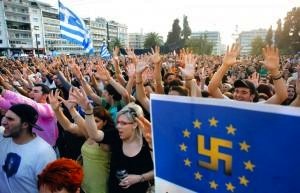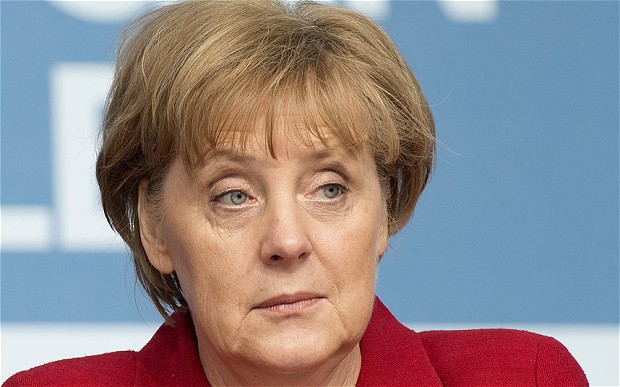By: Park MacDougald
Over the last 48 hours, the streets of Athens, Greece, have borne more resemblance to those of Baghdad or Beirut than to other European capitals. Photographs of rioters clashing with armored policemen against a backdrop of burning buildings and clouds of tear gas have spread across the world, and raised questions of whether the nation has the political will to stomach the harsh medicine of financial austerity. The riots were in response to the recent vote of the Greek Parliament – 199 to 74 – in favor of implementing the drastic spending cuts required in order to receive further bailout money from the European Central Bank (ECB) and avoid a default. However, the vote was largely a symbolic action, meant as a show of commitment to the program of reform. The more important test will be either passed or failed on Wednesday, Feb 15th, the deadline that the European Union (EU) has set for the Greek government to outline a new budget.
In many ways, the rioting is understandable. To say that the budget cuts are draconian is an understatement. The suggested measures would cut the minimum wage by around 22 percent, and promise to eliminate over 150,000 public sector jobs over the next 3 years; all this in a country whose unemployment currently sits around 20 percent, with that number doubled for young people. Although the Greek public sector was (and still is) bloated and inefficient to almost tragicomic proportions, the proposed cuts would amount to shrinking the Greek GDP 7 percent by fiscal year 2015. There is growing sentiment in Greece, whose economy has been toeing the line between recession and depression for the last three years, that default, or a withdrawal from the EU, could be no worse than what they are currently experiencing. A number of international commentators – notably Italian Prime Minister Mario Monti (whose country faces a similar, albeit less severe problem), have observed that overly harsh austerity measures may be more of a means of catharsis for northern European governments who are fed up with Greek “irresponsibility” than an actual prescription for economic growth.
However, another element is present in the riots that may speak more to the structural flaws of the European Union and its single currency experiment. The driving force behind the bailouts – and the harsh austerity programs – has been Germany. This makes sense; Germany is both the largest European country in terms of population (with 81 million people), and economic might, by itself accounting for 20 percent of the EU’s GDP. In addition, following the recent credit downgrade of France, Germany remains one of the few (and certainly the most powerful) European countries with an AAA credit rating. Other than debt-laden France, the only European country with the size and economic might to balance Germany – Great Britain – has in recent years sought to distance itself from the EU. All of these factors mean that Germany, seemingly by accident, has become the de facto hegemony of the EU.
Anyone who slept through his or her high-school European History class or watched more than thirty minutes of the History Channel ca. 2000 should be able to infer why German hegemony might present a problem when trying to enforce EU-wide policy. Example A is Greece, a nation that from 1941 to 1945 was occupied by Nazi Germany, losing over 300,000 civilians in Athens alone. In addition to the now-common practice of burning German flags, Greek protestors and even mainstream media outlets have increasingly made use of Nazi language and imagery to describe the “Fourth Reich” of the EU. Greek opposition newspapers have recently taken to referring to German Chancellor Angela Merkel as “Hitler,” and political cartoons frequently picture her and other members of the German government in World War II era Nazi or SS-style military uniforms. Popular commentators deliver rants describing Germany’s economic “Final Solution” for the Greek economy and likening various European politicians (including non-Germans, such as France’s Nicolas Sarkozy) to Himmler, Eichmann and Goebbels, among others. Even Greek politicians have not escaped the comparisons. Leftist newspapers have repeatedly referred to the ruling center-right party as “collaborators” in the economic occupation. One such victim has been Finance Minister Evangelos Venizelos, whose cartoon likeness has been repeatedly pictured delivering an enthusiastic “Sieg Heil!” and fascist salute to German soldiers.
One can hope that all this amounts to is a rather extreme form of electioneering. Greek elections are in April, and public rage towards all things EU or German is at an all-time high. As deplorable and extreme as the rhetoric may be, it is not all that different from typical political opportunism. If your political opponents are Nazi collaborators, one can expect to be elected rather easily. However, the explosion of anti-German sentiment is evidence that the wounds of the past may not be as healed as previously thought. Despite the rather crude formulations and inflammatory comparisons of some Greek politicians and media figures, they are giving voice to a very real and deep seated anger of a population that feels it is being made to suffer unjustly at the hands of those under whom it has suffered before. It is an anger based on both current events and historical resentments that are not likely to go away overnight.
The Greek reaction is also reason for pessimism regarding the future of the Eurozone. To blame the Germans for the lack of competitiveness in the Greek economy constitutes a massive denial of reality. Unfortunately, it seems as though this is a denial that politicians are more than willing to indulge. The reforms that are necessary to make the Greek economy viable and competitive will also be exceedingly painful for the Greek population. The same is true for Italy, Spain and Portugal. The pain in many cases promises to be so great that voters will be unwilling to bear it, and the politicians who are responsible for the mess in the first place will be content to sit back and blame an evil cabal of Nazis-cum-financiers rather than turn the blame inward. This is not to say that the Germans do not share some of the blame in the crisis, but it offers a grim prognosis for the capability of a German-dominated EU, as currently structured, to deal with the crises that will face it in the coming years.

